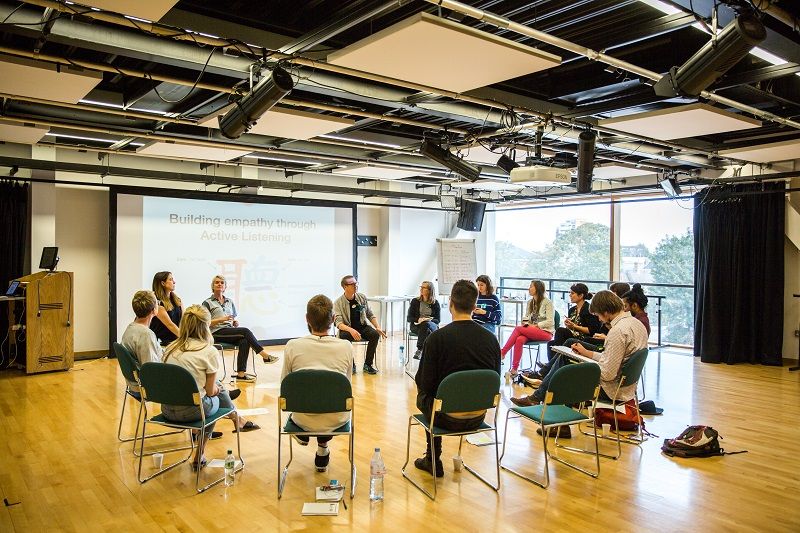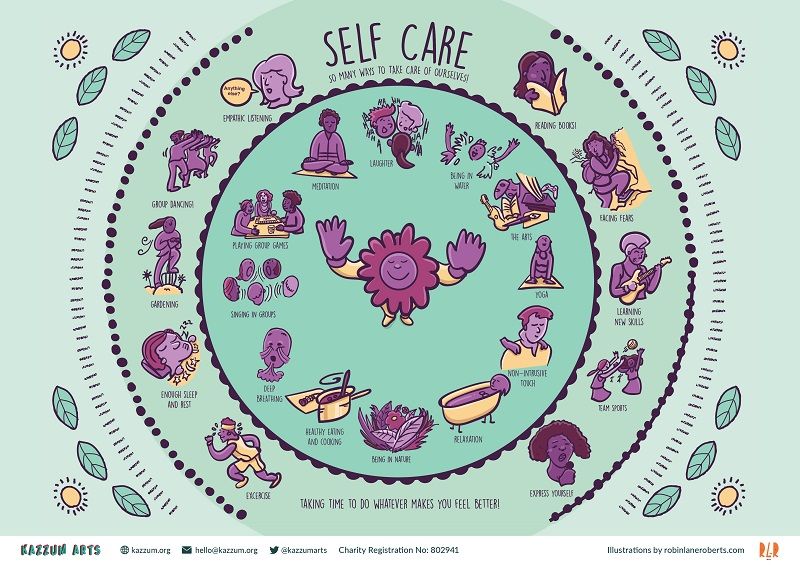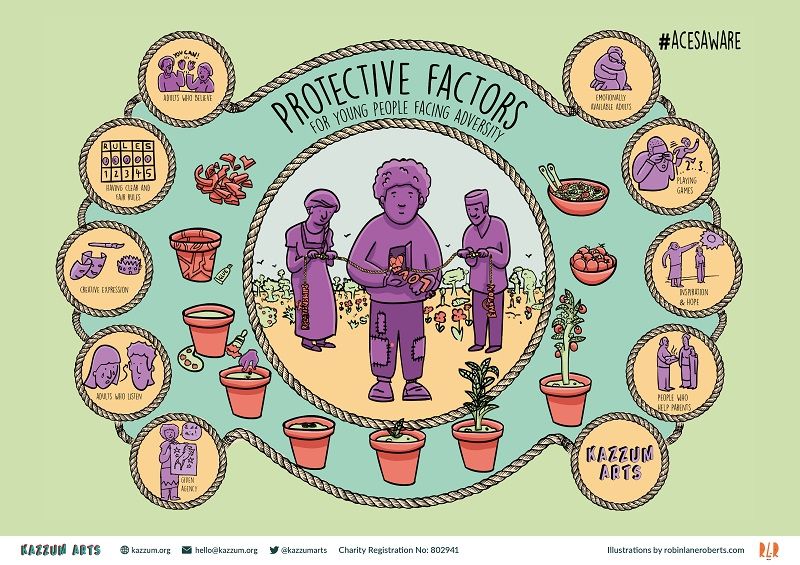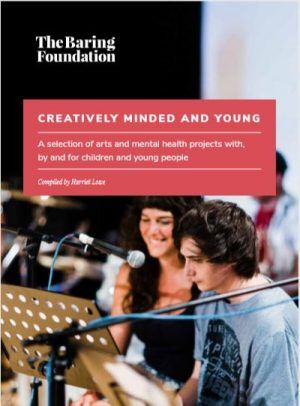Kazzum Arts are an Arts and Health charity working with children and young people at times in their life when they are most in need of support.
Our programmes offer creative and relational development opportunities within hospitals, refugee settings, mainstream and specialist schools; partnering professional artists with children and young people to develop creative approaches to mental health, wellbeing and social justice.
As a 32 year-old participatory arts organisation, our work has weathered many storms and taken many forms. We’ve gained a unique insight into the value and impact of arts processes for entertainment, inclusion and development; yet like so many organisations it is necessary to evolve and respond to the emerging needs from our participants and communities to develop new approaches to our work.
In 2017 it gradually became clear that we were holding an increasing and significant amount of trauma. It was playing out across our projects with increasing participant mental ill-health and diminished wellbeing, through our interpersonal communications with each other and our own personal sense of connectedness and wellness to our work. As the Artistic Director, I became aware of trauma-informed practice through my own therapeutic journey, and it felt like a beacon amidst the uncertainty and fear we were experiencing at the time. Trauma-informed practice emerged as a key modality for us to build our resilience as an organisation and commence our own personal journeys towards health, within an integrative framework which aligned to our existing values, skills and processes.
The Covid-19 pandemic offers a distinct opportunity to understand the traumatic stress that can arise from terrifying events beyond our control
I am convinced all readers here will have heard of the concept of trauma, and I imagine many have, or are currently working to process its far-reaching impact. The Covid-19 pandemic offers a distinct opportunity to understand the traumatic stress that can arise from terrifying events beyond our control, which can overwhelm, disconnect and fracture our sense of wholeness, safety and trust. Covid-19 aside, we may be carrying our own traumas or stewarding it for another. We may witness trauma moving through a community, or playing out on a political, national or international level. It may be held within our organisations – present on our Zoom calls, or carried and repeated throughout our work. Traumatic experiences might not have happened to us, but they might have happened to our ancestors, through generations of violence, subjugation, uncertainty and inequality, and so it seems that within the culture we have created and to which we have become adapted, trauma is rife.

Kazzum Arts truly began working towards our vision of a therapeutically minded, trauma-informed organisation which placed safety, equity and agency at the centre of our relationships in early 2018. The transformation has been incredible to both facilitate and be immersed in. There are many highlights of our journey, and it is by no means complete.
Investing in the staff and artists at Kazzum through ongoing training and reflective practice has offered the opportunity to develop the necessary professional and interpersonal skills needed to hold the trauma of others. The ‘mind-sight’ of our community has grown – we are more emotionally available, socially engaged and able to empathise with others whilst observing our boundaries.

Our interventions have become more playful and engaging, shifting our expectations for young people to ‘produce’ work and instead engage in our projects with a sense of wellness and connection. Trauma-informed delivery approaches are inherently asset-based and participant centred, instead of asking ‘what’s wrong with you?’, we wonder ‘what’s happened to you?’. By embodying curiosity, we can build the bonds of attachment which allow for care and creativity to flourish.
Instead of asking ‘what’s wrong with you?’, we wonder ‘what’s happened to you?’
We’ve also been able to diversify our work – producing animated resources and wellbeing tools to support young people and professionals within the education and charity sectors, and developing training programmes for leading arts organisations and individual practitioners to support their own journey into this complex, profound space.
Trauma-informed approaches also support us to reflect upon and take action within our anti-racist and anti-discriminatory practices. They align with our vision for social justice and offer a language for us to explore children’s rights with young people. Understanding trauma from a biological, social and psychological perspective supports our work to remain responsive and adaptive, and offer a unique approach which is very much valued by our partners.
Trauma-informed approaches also support us to reflect upon and take action within our anti-racist and anti-discriminatory practices
Four years into our journey (and one pandemic later) we continuously witness the impact of our approach across our organisation and understand the magnitude of our endeavour. Becoming trauma-informed has been a cultural transfiguration in the life of our organisation, rather than a tick box exercise for funding and marketing purposes. We’ve grown in our capacity to take each step as it comes, understanding that a trauma-informed environment needs the chance to mature over time on its own, individuated terms. We won’t get it right for everyone all of the time, but we are much better at repairing and connecting when there is learning to be done.

We’re now in the process of re-writing our next 4-year Business Plan – centring trauma-informed, anti-racist, human rights focussed and socially engaged care embedded within every policy and procedure. We aim to ensure that the approach is built into our organisational DNA for the benefit of generations of practitioners and participants to come. It’s a complex and sometimes daunting task, but the next necessary step to take in our ongoing journey. I feel a shared sense of pride in everyone at Kazzum for the work that has gone into our transformation so far – the energy, the connection, the surfacing of our fears, sadnesses and vulnerabilities. It hasn’t been an easy journey and I doubt that it will be simple in the future, but when I allow myself to gently wonder where this may take us over the next four years, I feel a swell of pride and hope for what is possible, and I know that we are on the right track.
If you are interested in learning more, please visit www.kazzum.org
To learn about our training for individuals and organisations click here: https://www.kazzum.org/train-with-kazzum-arts
To watch our ‘Animating Adversity’ series – a 4 part guide to Adverse Childhood Experiences and trauma-informed care please click here:
https://www.kazzum.org/trauma-informed-approach
Learn about our ‘Culture, Health and Wellbeing Alliance’ Award winning support for Staff and Participatory Artists here: https://www.kazzum.org/news/chwa
Connect with us on social media: @KazzumArts
Or get in touch! hello@kazzum.org
